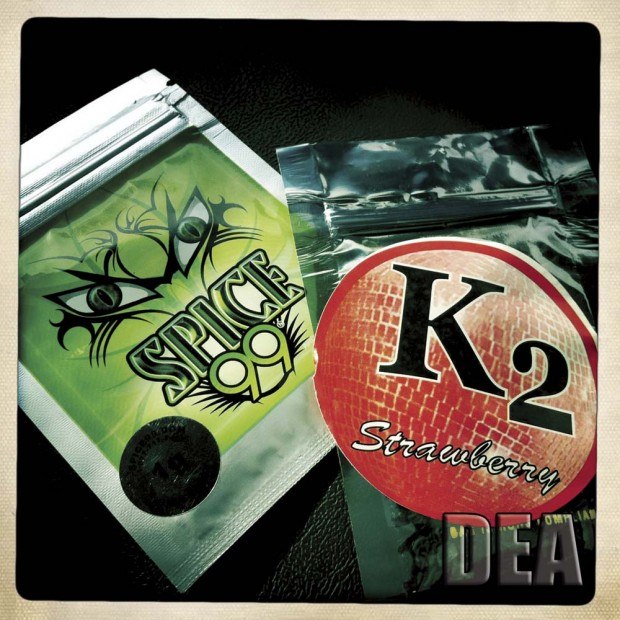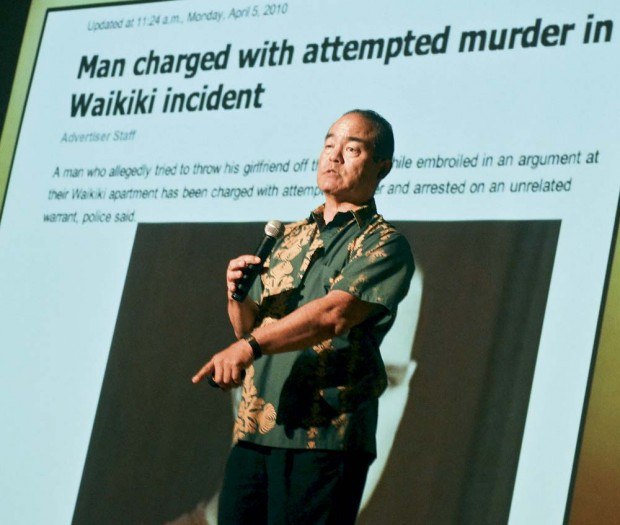LIHU‘E — The dangers of exotically named drugs such as Spice have made their mark with changes in the legal system and horrific stories. One case in particular seemed to stand out to Gary Shimabukuro of Laulima, Hawai‘i. Last April,
LIHU‘E — The dangers of exotically named drugs such as Spice have made their mark with changes in the legal system and horrific stories.
One case in particular seemed to stand out to Gary Shimabukuro of Laulima, Hawai‘i. Last April, he said, a 23-year-old man allegedly smoked the synthetic marijuana and then tried to gouge out his girlfriend’s eyes before attempting to throw her from the balcony of an 11th-floor Waikiki apartment.
“Sad, but typical,” the drug awareness and prevention speaker said Tuesday during a training for the law enforcement and medical community.
Formally considered a “legal high,” like many other designer drugs that have hit the market, Spice has since been temporarily designated a Schedule I controlled substance under the Controlled Substances Act.
Designer drugs, Shimabukuro explained, refer to drugs created “to get around existing drug laws usually by modifying molecular structures.”
While lawmakers are working to control these new narcotics, hundreds of new drugs are being produced for every handful that are made illegal each year.
“New products are coming out all the time,” Shimabukuro said.
He said “analog laws” need to be created. That way, similar drugs could be made illegal, too, in one swoop.
Sex Assault Nurse Examiner Ricko Rask helped set up the two training sessions, along with a public event in Waimea and at Waimea schools.
“It’s our only chance,” Rask said of the need for “analog laws.”
Synthetic marijuana has been increasingly problematic, Shimabukuro said, with more than 1,000 reports to poison control centers. Spice, and a similar drug called K2, have been sold as incense and aren’t fit for human consumption. They’re also hard to track and can’t necessarily be seen in urine analysis, making such drugs popular with the military.
“If I was a drug user, I’d do this,” Shimabukuro said. “I wouldn’t get caught.”
While these and other new drugs are meant to mimic the real thing, many are more intense or may cause side effects that users don’t expect.
“It’s much stronger. If anything, they should be watering it down,” Shimabukuro said.
As an emergency room nurse, Rask said she’s treated several people on Spice who had violent, paranoid reactions. Self-mutilation, she said, is also common.
The training sessions drew about 75 people, including police officers, prosecutors and medical professionals hoping to learn more about drug trends.
Pharm parties popular
Shimabukuro spent much of the three-hour afternoon training session showing videos of young people high on ecstasy, news clips of drug-related deaths, the ingenious ways people hide narcotics — using hidden pockets in clothing, slippers and even water bottles — new and old “date rape” drugs and something called pharm parties. According to a news clip at the training, a young woman said teens will each get whatever prescription pills they can find in a medicine cabinet and then pour them into a bowl and pick out a few.
“Do we have pharm parties in Hawai‘i?” Shimabukuro asked the group. “Yes, we do.”
And it’s not necessarily bad kids taking the drugs. Even straight-A, scholarship winners are popping them like candy. He said they have the perception that the drugs are safe because they’re prescribed by a doctor.
“They can die from one, but a lot of times they’re mixing,” he said.
The rise in off-label prescription drug use is rising, meaning people are not using the medications as intended. Rask said about 84,000 pain pills are prescribed per day in the state.
“It’s hard to wrap your mind around that, isn’t it?” she said.
Rask, who asked for Shimabukuro’s help to learn more about drug trends after she didn’t recognize a patient was on Spice, said she gained much from the event and hopes other participants did too.
She said she especially had a “holy Toledo” moment when Shimabukuro showed how easy it is for young people to get their hands on prescription pills. Some people even use open house events to pick through medicine cabinets.
“It’s enemy No. 1 in our country as far as drug abuse goes,” Rask said. “It’s enemy No. 1 in our state.”
• Jessica Musicar, staff writer, can be reached at 245-3681 (ext. 224) or by e-mailing jmusicar@thegardenisland.com.



